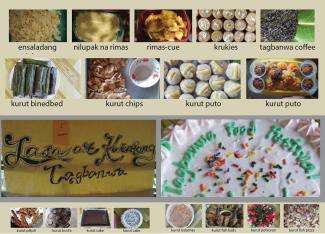The current pandemic did not become a hindrance to the conduct of the Lasa at Kwentong Calamian Tagbanwa (Tastes and Tales of the Calamian Tagbanwa), a yearly event to celebrate the bounty of their indigenous food. It was brought to low-key community-level feast that even emphasized the need for food security in difficult times such as this. The Lamud-Marabal and Calawit Ancestral Domains conducted a Tagbanwa Food Festival on August 7 and 15, respectively. Participants included women who are familiar with their traditional food sources as passed on through generations, women who have realized the importance of traditional food and are now promoting these, and new recruits that discover fusion cooking. Together, these women advocate for the conservation of traditional food, otherwise known as silipeten in the Tagbanwa dialect.

Staples that have been popular since the first year include the ensaladang labong (bamboo shoot salad), nilupak na rimas (breadfruit mash), and rimas-cue (sugar-coated breadfruit). Making a breakthrough was the krukies, cookies made from kurut which is a toxin-containing root crop usually steamed of roasted. Most of the food prepared was partnered with the traditional tagbanwa-roast coffee.

Previous discussions finally led to the realization of the kurut na binedbed and kurut chips served with coco-vinegar. The kurut puto came in 2 versions: plain traditional and fancy style.

Coming from the same dough recipe are the kurut pilipit and the kurut buchi, which had an ube jam filling. The kurut cake also had a traditional version with a chocolate topping and a sweeter version with pastel icing.

Many were amazed with the many recipes that used kurut in its flour form, such as kalamay, fish balls, polvoron, and even pizza.
Aptly supporting the women were men from the community who gladly gave a hand in gathering firewood, climbing for coconuts and grating the meat, rolling the dough, frying the chips, and joining the taste-test most of all. Tastes and Tales had an additional Tune added to it, stressing the importance of silipeten.
This project is supported by Tikvah Grassroots Empowerment Fund, through the Tides Foundation.




